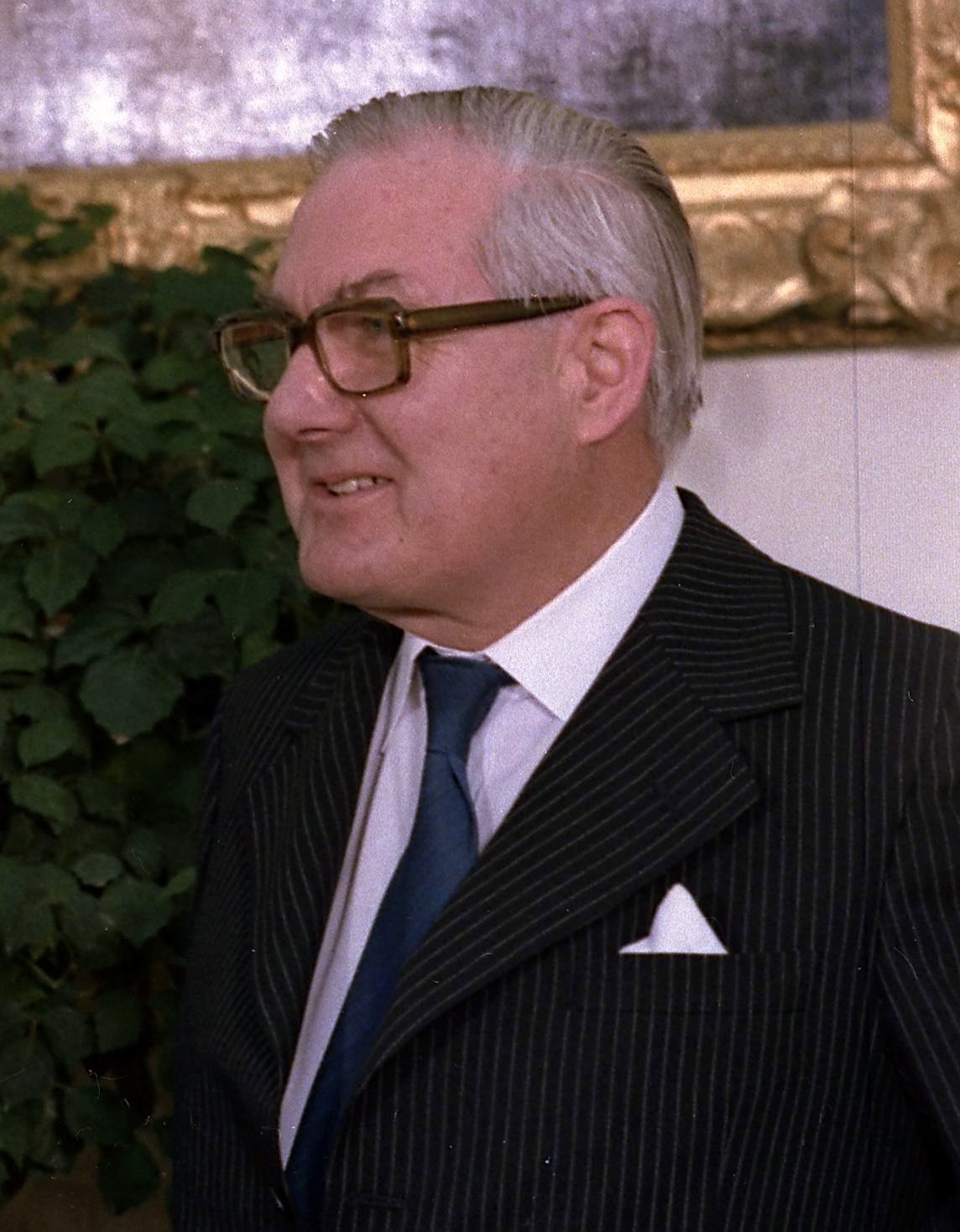James Callaghan frases e citações
James Callaghan: Frases em inglês
On Robin Day's phone-in (27 May 1975), quoted in David Butler and Uwe Kitzinger, The 1975 Referendum (Macmillan, 1976), p. 176.
Foreign Secretary
“A lie can be halfway round the world before the truth has got its boots on.”
Though widely quoted from his speech in the House of Commons, (1 November 1976) published in Hansard, House of Commons, 5th series, vol. 918, col. 976.; this is actually a very old paraphrase of a statement of the 19th century minister Charles Spurgeon: "A lie travels round the world while truth is putting on her boots." Even in the paraphrased form Callaghan used, it was in widely familiar, many years prior to his use of it, and is evidenced to have been published in that form at least as early as 1939.
Misattributed
“Now that the House of Commons has declared itself, we shall take our case to the country.”
Speech http://hansard.millbanksystems.com/commons/1979/mar/28/her-majestys-government-opposition-motion in the House of Commons (28 March 1979). Following the announcement that the government had lost by 1 vote, Callaghan declared his intention to call a general election
Prime Minister
Reynolds News (17 March 1946)
Backbench MP
Speech http://hansard.millbanksystems.com/commons/1976/nov/09/economic-policy in the House of Commons (9 November 1976)
Prime Minister
"Mr Callaghan renews plea for 5% pay guideline", The Times, 6 September 1978, p. 4.
Speech at the Trades Union Congress, 5 September 1978. Callaghan was teasing the audience about the date for the impending general election. Although his message was intended to convey that he may not call an election in October, many people interpreted him as saying that the opposition would be caught unprepared by an October election.
Callaghan deliberately misattributed the music hall song "Waiting at the Church" to Marie Lloyd rather than to its real singer, Vesta Victoria, knowing that Vesta Victoria was too obscure for the audience to recognise.
“A leader has to appear consistent. That doesn't mean he has to be consistent.”
Post-Prime Ministerial
Fonte: The Harvard Business Review (1 November 1986)
Speech at Southampton (25 May 1971)
Shadow Chancellor of the Exchequer
Speech to the Labour Party Conference in Brighton (5 October 1977), quoted in Labour Party Annual Conference Report 1977, p. 217
Prime Minister
Labour Party Annual Conference Report 1976, page 188.
Speech at the Labour Party Conference, 28 September 1976. This part of his speech was written by his son-in-law, future BBC Economics correspondent Peter Jay.
Prime Minister
Labour Party Annual Conference Report 1976, p. 188.
Speech at the Labour Party Conference, 28 September 1976.
Prime Minister
The Guardian (19 November 1982)
Post-Prime Ministerial
Speech http://hansard.millbanksystems.com/commons/1983/jan/26/falkland-islands-franks-report in the House of Commons (26 January 1983) responding to the Franks Inquiry into intelligence before the Falklands War.
Post-Prime Ministerial
On the general election of 1979, quoted in Kenneth Morgan, Callaghan: A Life (1997), p. 697
Prime Minister
Speech http://hansard.millbanksystems.com/commons/1960/dec/15/south-west-africa in the House of Commons (15 December 1960)
Shadow Chancellor of the Exchequer
Referendum broadcast (2 June 1975).
Callaghan had not wanted to appear in a broadcast for 'Britain in Europe', so he was instead introduced as the Foreign Secretary giving a separate broadcast within a 'Britain in Europe' timeslot.
Foreign Secretary
“A leader must have the courage to act against an expert's advice.”
The Harvard Business Review (1 November 1986)
Post-Prime Ministerial
Response to Evening Standard reporter's question "What is your general approach, in view of the mounting chaos in the country at the moment?" (10 January 1979); used to justify The Sun headline "Crisis? What Crisis?" on 11 January.
Prime Minister
Interview (2 May 1979), quoted in Michael Pilsworth, "Balanced Broadcasting", in David Butler and Dennis Kavanagh, The British General Election of 1979 (Macmillan, 1980), pp. 207-208.
Callaghan objects to the line of questioning of ITN's David Rose in an interview recorded on 2 May 1979. He was eventually persuaded to return and recorded a new interview, but owing to an agreement with NBC TV that they should have access to all material recorded by ITN, it was shown in the USA and then reported in the Daily Telegraph.
Prime Minister
"Chancellor stands by three per cent growth and no devaluation", The Times (25 July 1967), p. 13
The government was forced to devalue in November 1967.
Chancellor of the Exchequer
Speech at Cardiff (25 May 1983), quoted in Tim Jones, "Callaghan defends deterrent", The Times (26 May 1983), p. 1. This was during the 1983 general election in which the Labour Party had a policy of unilateral nuclear disarmament.
Post-Prime Ministerial
“I think there is a case for opening a national debate on these matters.”
Speech http://hansard.millbanksystems.com/commons/1976/oct/14/economic-policy-2 in the House of Commons (14 October 1976), referring to education policy. The phrase "national debate on education" is associated with Callaghan's speech at Ruskin College on 18 October 1976 but appears nowhere in the text; it was however used extensively in pre-briefing for the contents of the speech.
Prime Minister
Speech http://hansard.millbanksystems.com/commons/1979/mar/28/her-majestys-government-opposition-motion in the House of Commons (28 March 1979). In the No confidence debate which brought his government down on 28 March 1979, Callaghan poked fun at the opposition parties and drew attention to their low showing in opinion polls. In the event the Scottish National Party lost 9 of its 11 seats
Prime Minister
Speech at Woolwich (30 January 1976)
Foreign Secretary
Interview on BBC television (20 May 1965)
Chancellor of the Exchequer
Remarks to the Cabinet quoted in Tony Benn's diary (1 February 1979), quoted in Tony Benn, Conflicts of Interest: Diaries 1977–80 (Hutchinson, 1990), p. 450
Prime Minister
Speech https://www.theguardian.com/education/thegreatdebate/story/0,,574645,00.html to Ruskin College, Oxford University (18 October 1976)
Prime Minister
Speech https://www.theguardian.com/education/thegreatdebate/story/0,,574645,00.html to Ruskin College, Oxford University (18 October 1976)
Prime Minister
Speech to the Labour Party Conference in Blackpool (28 September 1976), quoted in Labour Party Annual Conference Report 1976, p. 188 and James Callaghan, Time and Chance (Collins, 1987), p. 426. This part of his speech was written by his son-in-law, future BBC Economics correspondent Peter Jay
Prime Minister
